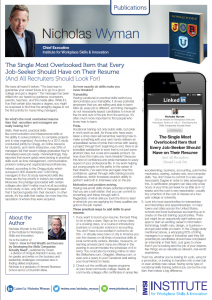

We have all heard it before: “The best way to guarantee your career future is to go to a good college and get a degree.” The message has been drilled into our heads by guidance counselors, parents, teachers, and the media alike. While it’s true that certain jobs require a degree, you might be surprised to find that the almighty degree is not the first priority for many hiring managers.
So what’s the most overlooked resume item that recruiters and managers are really looking for?
Skills. Real-world, practical skills: like communication and interpersonal skills or the ability to solve problems, to complete projects and to stay organized. According to a 2013 study conducted jointly by Chegg, an online resource for students, and Harris Interactive, only 39% of managers felt that recent college graduates they’d interviewed were job-ready. Overwhelmingly, they reported that recent grads were lacking in practical skills such as time management, communication, problem-solving and organizational proficiencies.
Indeed, according to the Chegg study, which surveyed 2,000 students and 1,000 hiring managers in the US study real-world skills like these are the top priority in today’s job market. Moreover, the prestige associated with certain colleges also didn’t matter much at all according to the study. In fact, only 28% of managers said that it factored greatly into their decision. In other words, it’s the skills that matter, far more than the reputation of where they were acquired.
So how exactly do skills make you more hireable?
Trainability. Having vocational or practical skills behind you demonstrates your trainability; it shows potential employers that you are willing and able to learn. After all, every job is different, and hiring managers do not necessarily expect candidates to know all the ins and outs of the job from the word go. It’s often much more important to find people who know how to learn.
Pride. Vocational training not only builds skills, but pride in one’s work as well. As those who have every taken a shop class will remember, learning how to make something with your own hands delivers an unparalleled sense of pride that comes with seeing a project through from beginning to end; there is an incredible satisfaction in work that is not just some abstract idea, but a real and useable product. So how does this make you more hirable? Because this kind of confidence and pride translates to every aspect of your professional life. In my work helping put young people on the paths to the career of their dreams, I’ve seen time and again how the confidence gained through skills training boosts confidence, which increases people’s ability to perform well both in interviews and on the job.
Motivation and problem-solving. Having real-world skills shows potential employers that you are a self-starter; that you can commit to something and follow through with it. Regardless of what skill you took the time to learn or what job you are applying for, these qualities are gold on the job market.
Three practical ways to add skills to your resume:
1. If you want to boost your resume, the best thing to do is take a class. Sign up for a shop class, or a cooking class, or a course in introductory business or computer science or accounting. You don’t have to be enrolled in school to do this – in virtually every town or city in America you can find classes on all kinds of practical skills at local community centers, libraries, museums, or learning annexes (and many are offered in the evening to accommodate the schedules of 9 to 5ers). You could also try looking online on sites like Skillsshare.com, Craigslist, Meetup.com, or even post a query to your Facebook wall asking your local friends for leads.
2. Check out the certificate degree programs at your local community college. Nearly all community colleges offer certificates in areas like woodworking, business, accounting, automotive mechanics, sewing, culinary arts, and computer skills. You don’t have to commit to a two-year Associate’s Degree in order to take advantage of this. A certification program can take only a few hours of your time per week for as little as 6-12 weeks and the cost is very reasonable—usually tiny a fraction of the cost of classes at a four-year college or university.
3. Look into local opportunities for traineeships, internships and apprenticeships. In many towns and cities across the United States, schools and local businesses are teaming up to create on-the-job training opportunities. There just might be an opportunity right before your eyes to start an exciting career in information technology, health care, design, or business—and get paid while you learn. In the Chegg study mentioned above, a whopping 82% of hiring managers in a range of industries said they felt potential job candidates should have completed an internship in their field. Just goes to show that if you’re looking to land the job of your dreams, few things are as valuable as relevant, real-world experience.
Trust me, whether you’re looking for a job, vying for a promotion, or looking to transition into a new role or even entirely new career, having some type of vocational skills training behind you can be the one item that makes a big difference.
